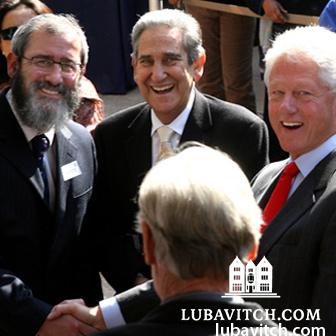South Africans are facing the unknown, again. Following new president, Jacob Zuma’s triumph last week, many in the broader Jewish community are trying to decipher their place in this ever-changing land. More than 30 years ago, the Lubavitcher Rebbe encouraged the community to stay put, stating that, “South Africa will be good for the Jews until Moshiach comes.” Today, despite widespread concern, his 40 Chabad representatives stationed throughout the country are ensuring that his pledge remain true.
South Africa’s Jewish Community
(lubavitch.com) It is early on Monday morning and the bus is rolling into the Chabad House parking lot on Aintree Avenue. Forty senior citizens, from across the city and surrounding suburbs, enter the center. For the next several hours, these men and women will study various aspects of Jewish thought and tradition. After learning, they will enjoy a hot, catered lunch.
For many of these older adults in Johannesburg, it is much more than the stipend that they gain from these daily classes. Most of their children have left the country of their youth to plant new roots in Australia, the United States, and Israel. For their parents, lonely and often poor, these classes are both physical and spiritual lifelines.
Despite the ever-present trickle of emigration, and beyond the high-security fences, the 75,000 Jews who proudly call the tip of Africa home are quick to point out that life here is vibrant.
In Johannesburg, a city which built its fortune deep in the gold mines, a different precious gem is being excavated today: Jewish life.
The local Chabad outposts, there are 10 in Johannesburg, say that regardless of the country’s unique challenges; they are committed to staying put. “We are building strong communities,” declares Rabbi David Masinter. “Our goal here is to make Jewish life as accessible as possible.” Masinter and a dozen other Chabad rabbis service the 60,000 Jews still living in Johannesburg. To achieve their goal “of touching every Jewish life,” Chabad runs programs for the entire spectrum of the community, from posting a list of Jewish baby names on their website to lectures for senior citizens.
But it is not only the Jewish community that Chabad of Johannesburg serves. “We learn in Jeremiah to take care of the people of the entire city,” explains Masinter. To help promote good values, Masinter says Chabad has instituted is a series of books translated into several African languages teaching morals and ethics. Another initiative sent 6,500 packets of carrot seeds to poor, black townships. The children there are encouraged to plant their own gardens and learn the value of self-sufficiency and partnership.
These outreach efforts, which have received numerous civic awards, stem from the Rebbe’s instructions to prepare the world for the coming of Moshiach through acts of goodness and kindness.
South Africa may be disparaged in international media, but its Jewish community is admired for its uniqueness. South African Jews, whether in their native land or in transplanted homes, are known to be close-knit and very traditional. Compared to Jews in other parts of the globe, South Africans have some of the lowest levels of assimilation: intermarriage here is less than 10 percent. “At least 80 percent of the community,” says Masinter, “has a strong Jewish awareness. “And we have very little anti-Semitism here,” he adds.
For holiday, Joburgers often hit the beaches of Kwazulu-Natal. Their Jewish needs are taken care of there, by the full-time Chabad House which services 40 local families and thousands of annual visitors. Julia Prosser, a noted historian who recently completed a book about the history of the Jews in the region, speaks highly of the local Chabad center.
“It is marvelous what they have accomplished,” Prosser says. “The Rabbi [Shlomo Wainer] travels hundreds of kilometers visiting tiny settlements, in search of Jews. He brings them back into the community.”
Prosser says that in her youth there were 10,000 Jews in Durban. Today, there are less than 2,000. Though the community is small, she says, “a lot of people have become involved through Chabad’s efforts. Jewish life is thriving.”
Jewish life is also flourishing under Cape Town’s balmy skies and the sweeping shadow of Table Mountain. Rabbi Mendel Popack has been servicing the city’s Jews since he and his family arrived in South Africa’s second-largest city in 1975.
“When we arrived, there were no mikvahs,” Popack recalls, “and my wife had to travel two hours by plane to Johannesburg to use their ritual bath.” Within a few years, Popack built Cape Town’s first mikvah, and today 140 local women use it regularly.
There are 150 students in Chabad-sponsored schools here, and many more spend their afternoons at the children’s multimedia center at the Chabad House. “Everything necessary for a Jewish life is available here,” Popack claims, including a Judaica store he operates. “The large supermarkets vie for our business and stock every kosher product imaginable,” he says. Programs that operate in communities around the world, such as JLI (the Jewish Learning Institute) and Friendship Circle, are run here with a special flair. Demand is acute, says Popack, and new centers in outlying regions have recently opened.
But even Popack admits that the numbers are falling. “At its height there were 25,000 Jews in Cape Town,” he says, “today there are only 18,000.” Popack believes that “South Africans are notorious for being wandering Jews.” Many left in 1977 and in the early 1990s during national crises. And in the intervening years, he says, there are always a handful, “who wonder whether to wander.”
For Popack, and the many other Chabad families who devote their lives to the people of this country, there is no wondering. “I am not leaving town because the Lubavitcher Rebbe sent me,” he declares.
“We have a lot of work to do. Until every Jew is taken care of materially and spiritually, we have a lot of work to do.”

Be the first to write a comment.